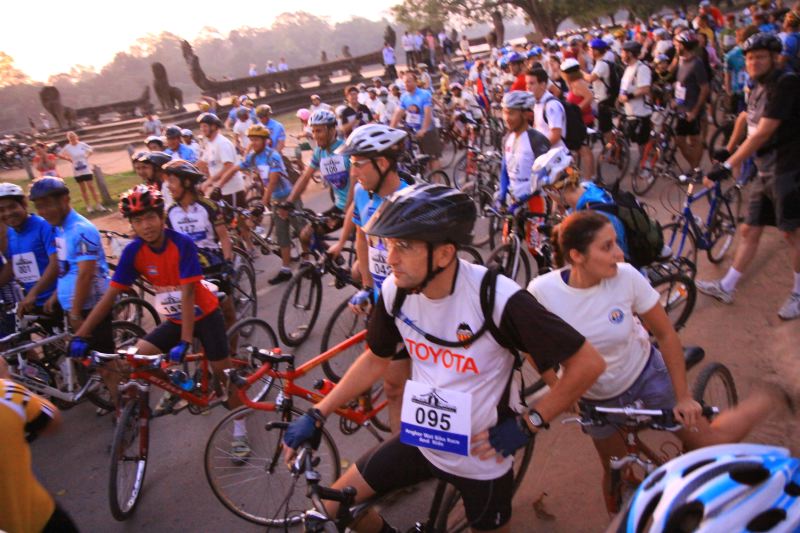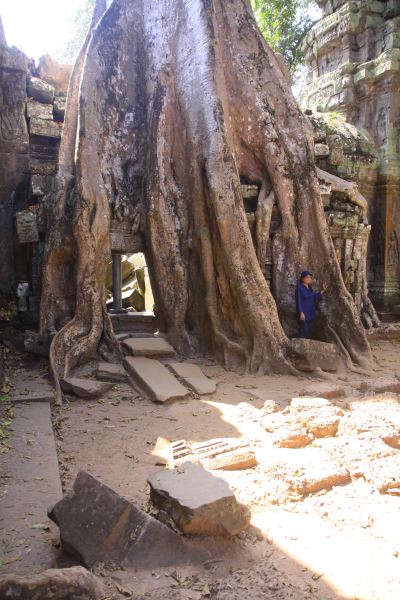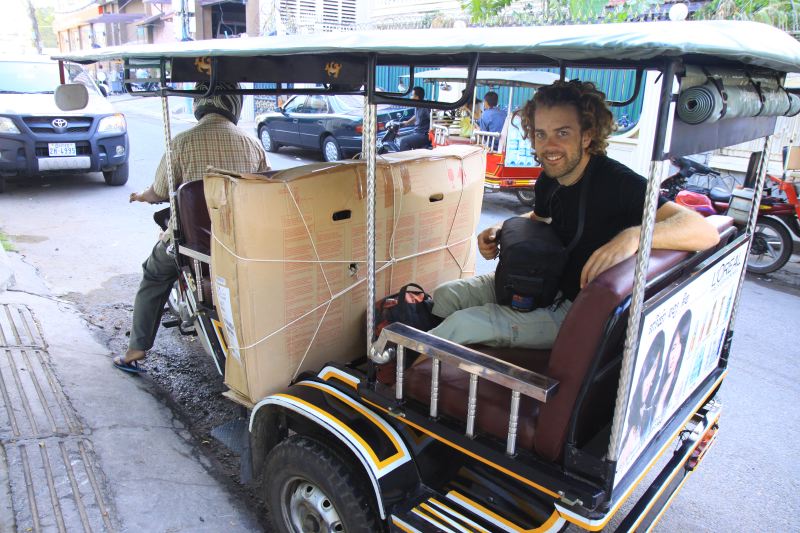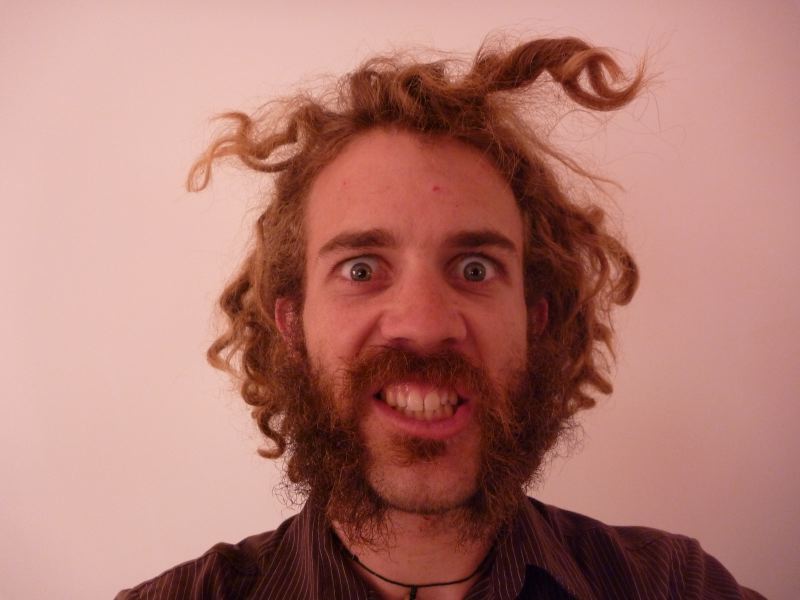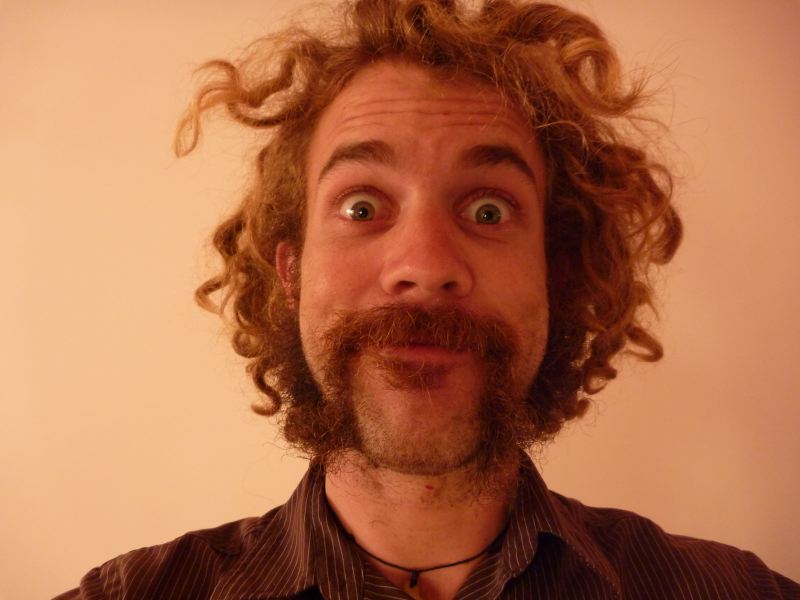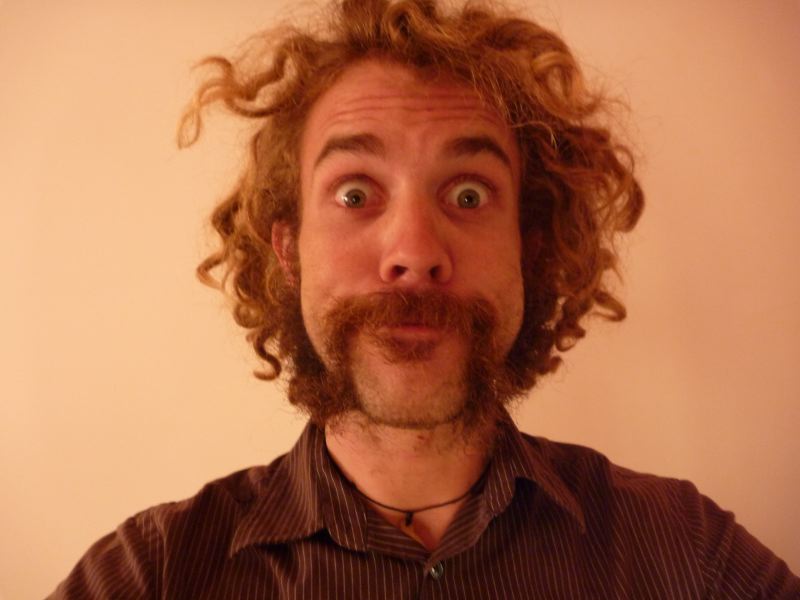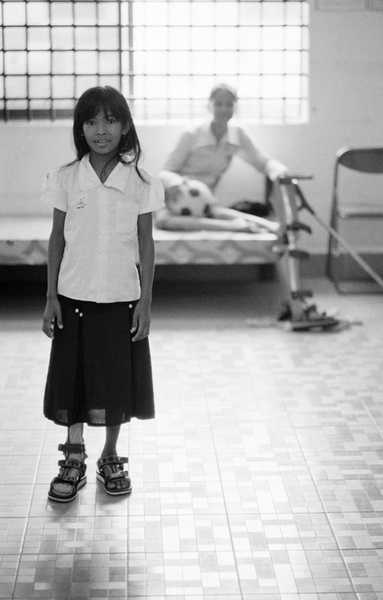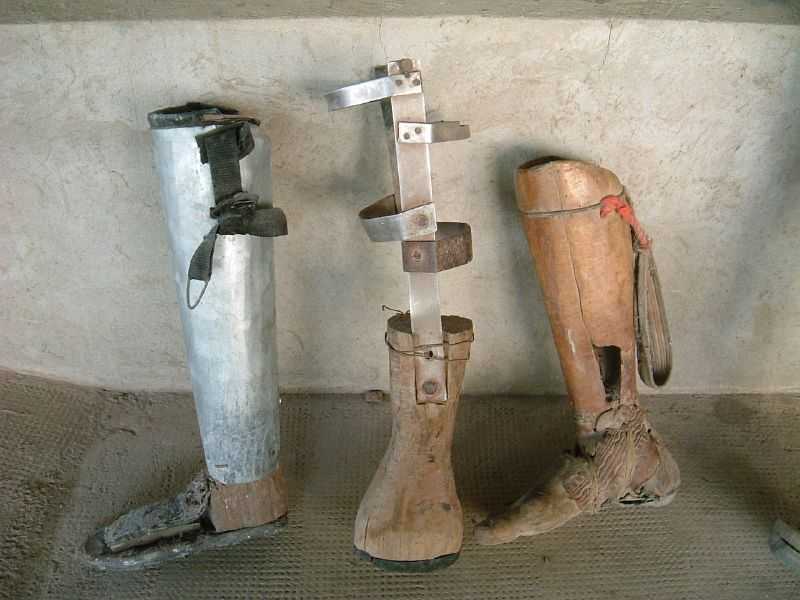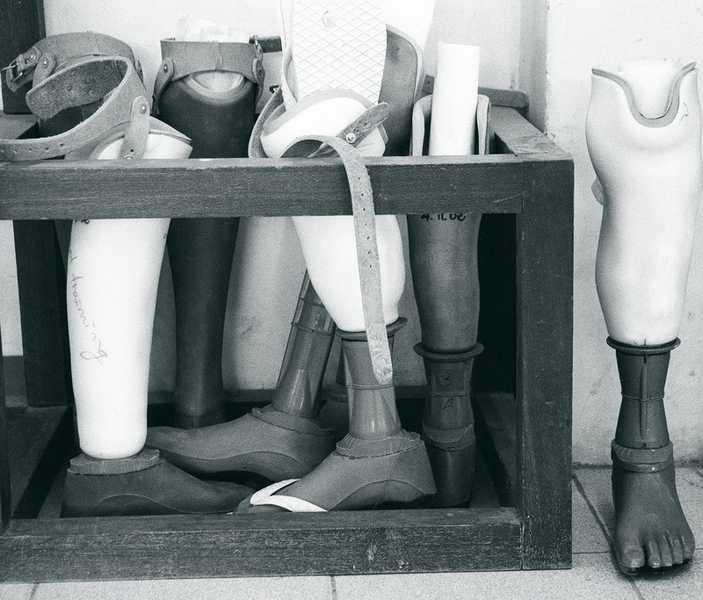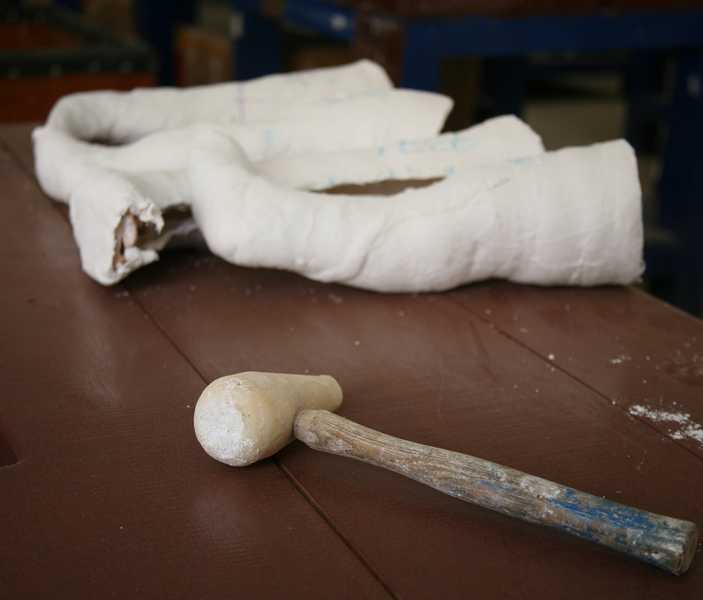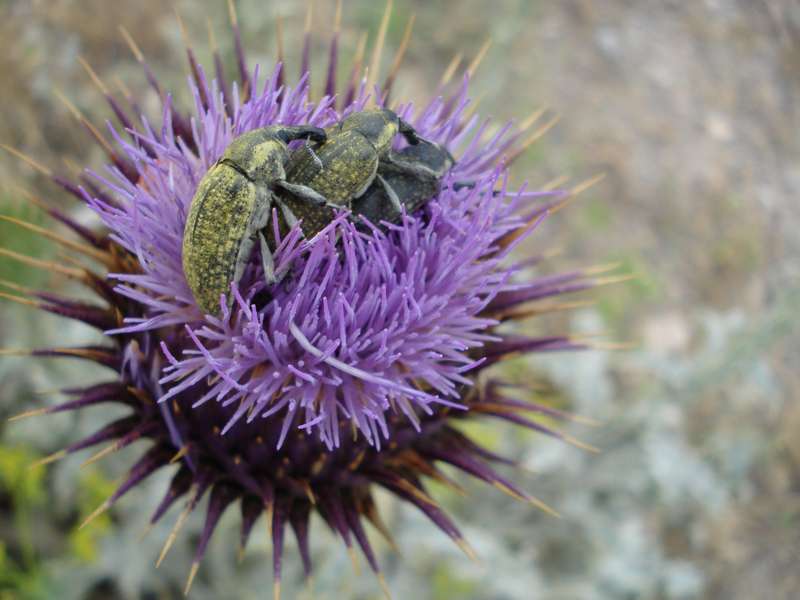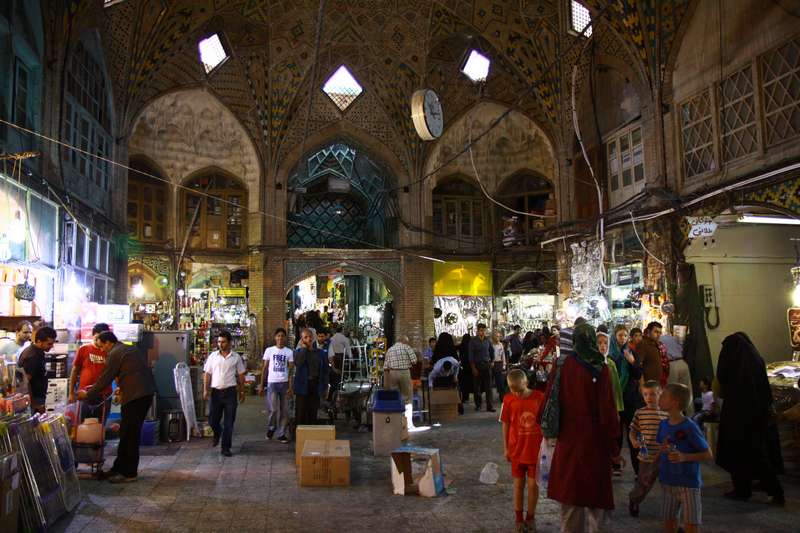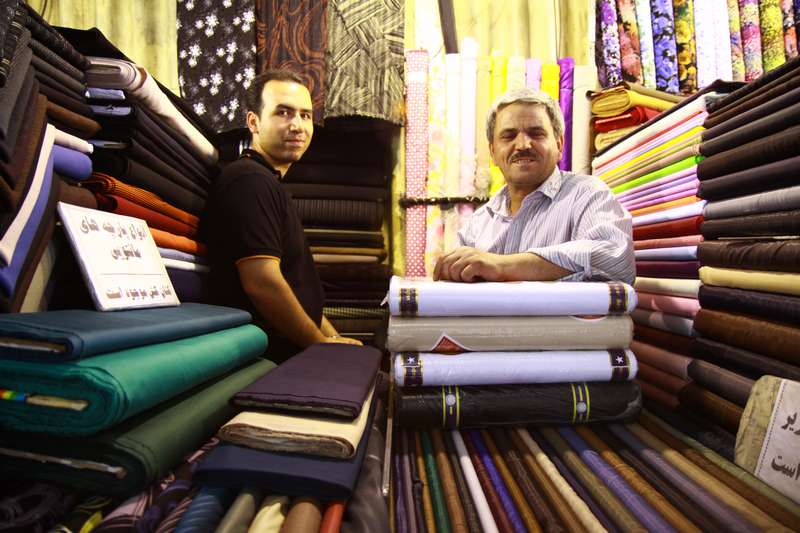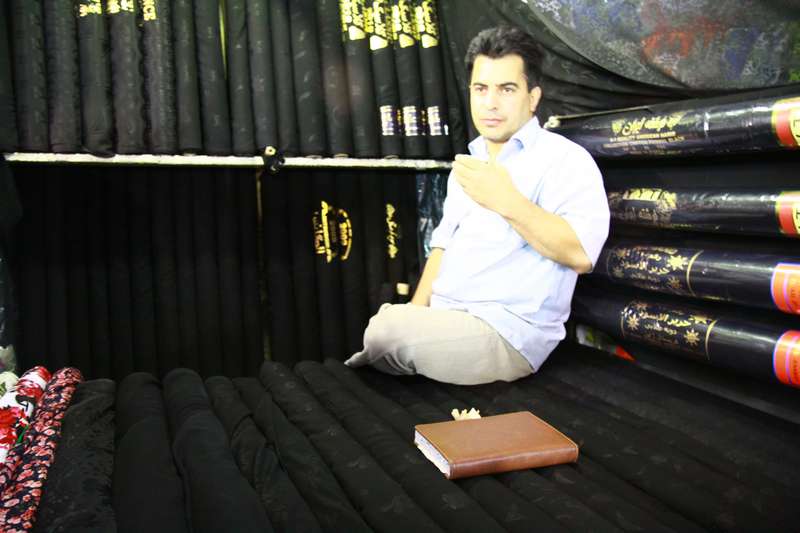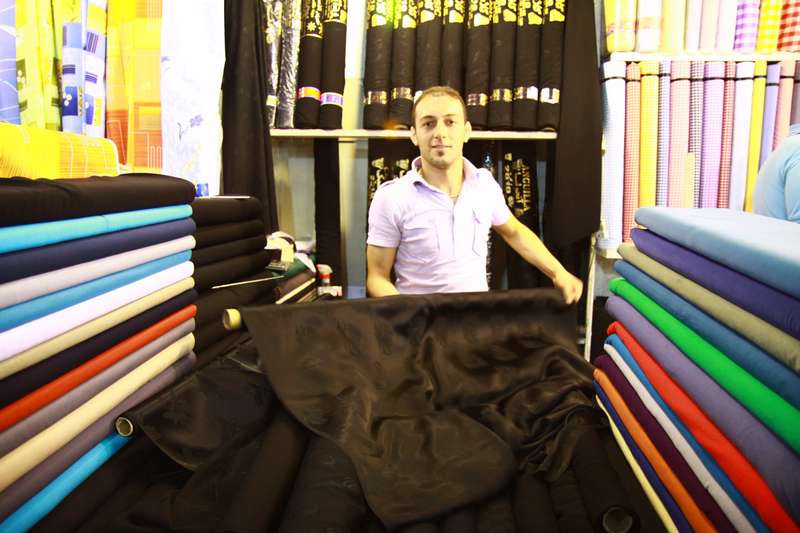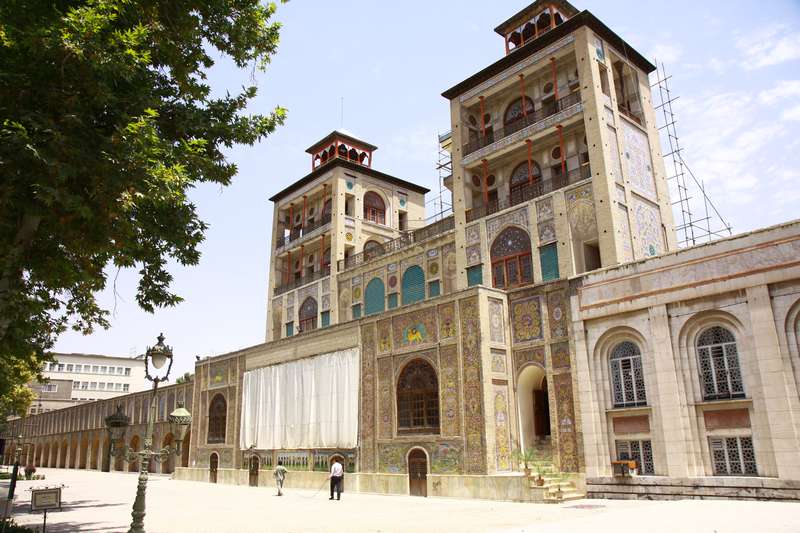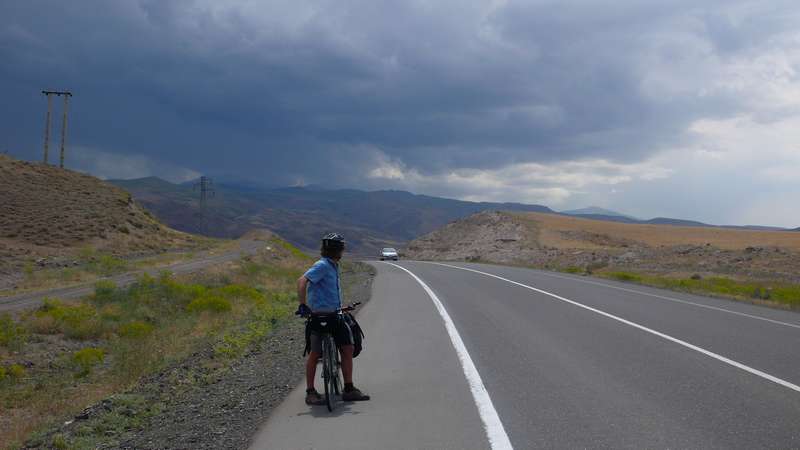All photos of me where taken by Stefan Brandl: www.thetramp.at
I wander in a dazed state, just 50 minutes on the plane and I'm in another world, Bahrain International Airport. Awash with people of 100 nations, Arabs in long white outfits, Indians in saris and turbans, men in business suites, European backpackers clutching their guide books and Nepali guest workers all coughing in unison as if they've caught the same cold. A masked man screens me for Swine Flu, do I have a fever? Not yet I respond. I purchase a Greek salad from an Asian women named Minnie Cho who speaks impeccable American English then sit with an American of Syrian origin working in Bahrain, waiting for that flight to Jordon. As I wait, two middle aged Iranians on their way to the disco's of Goa, who, almost as if compelled by their culture, buy me a huge bag of nuts for the road. I feel somewhat hollow inside, I'm again anonymous, just another human being amongst the masses seeking to make a better life in this oil rich Arab state. I'm no longer strange and intriguing, no staring or giggling scarfed girls, no "Hello Mister, where are you from?". I feel sadness to leave a country where I felt always so looked after, as our last host said "A guest is the son of God" and we certainly were treated that way, totally spoiled you could say. Though this sense of obligation to take care of the guest pull many emotional strings inside too, why couldn't we just interact as friends, or brothers. Why do they feel so compelled to give, give, give. In my world a true relationship is a two way interaction, give a little and take a little. This is not quite so in Iran.
Before entering Iran, avoiding politics and religion was a top priority. Quickly it becomes apparent that almost every conversation leads to this topics as they burn on the tip of every Iranian's tongue. After recent elections, we were told by several people that the announced winner received no more than 6 million of the 40 million votes. It is said that the Mullahs, who hold a position of power higher than the president, pulled the right strings to put Mr. Ahmedanejad back into power, this sparked deadly protests in the streets which led to the deaths of more than 20 people, these protests continue in Tehran in another form. At night the people are going to the roofes of their apartments and yelling "Allah akbar", God is great. The reason for using this expression seems strange to me and I was never given an explanation, but the people of Iran continue their struggle for freedom.
Not everyone isagainst the government, in small, generally poor towns and villages it seems that cash handouts, building schools and other government funded projects have created support for Mr. Ahmedanejad. Posters of the president can often be seen in shops and in the homes of people in these areas. I met just one person from a city who supported the current regime, his viewpoint being that a lack of religion in the world is the cause of all conflict. I chose not to get into a discussion with him on that one. I was told that nationally less than 65% of the population attend the Mosque once a week or more, which is the minimum requirement in order to be a Muslim. The law stating that women must be covered in public extends only to the gates and doors of homes all over the country, with a very different life inside. Alcohol, drugs, sex, parties etc. are all very available, you just have to know how to work around the law and where to look.
As we enter the boulevard, a few guys can be seen leaning against parked cars on the side of the road, each trying to show off their muscular bodies. We choose the more common method, driving in the best car available (on a scale of 1 to 100, I'm told that our Nissan pick-up truck is a 75.) around the avenue, a 2 km strip of 2 lane road where car loads of girls and car loads of boys circulate in search of each other. Once a person of interest is spotted, a game of cat and mouse begins, we maneuver our car alongside her vehicle, with a short toot of the horn and small wave she opens the window, after a brief introduction, they are interested. My friend arranges to meet them in a quiet ally near by, away from the view of the vigilant police who can arrest us for such interactions with the opposite sex. We follow their small car as they adjust their hair and makeup in the rear view mirrors. We pull up alongside and stop, the driver lets her head scarf drop to reveal a meticulously tended hair style. As I don't speak Farsi, I don't understand what they are saying, however the seductive tone or her voice is obvious. I'm told I have beautiful hair and eyes by the curly haired girl in the front seat. They exchange numbers as we must move on, my friend tells me that we can meet them later if we want. I decline the offer, more than content to experience what lengths humans will go to in order to fulfill a basic desire, law or no law.
Back at my friends place, the door bell rings, he opens and in walks a tall, blond girl dressed in a tight white top and pants. She carries a dish of pasta in one hand and a blue headscarf in the other. My friend tells me this is one of his 3 girlfriends as she begins to clean the kitchen in his small basement flat. Once finished they sit together on the couch to discuss the upcoming operation to 'correct' his nose. Earlier they had visited the plastic surgeon with the girlfriend of his friend to convince her how much better her life would beafter the $3000 operation. This kind of surgery is incredibly common in Iran, women and men can often be seen with the characteristic bandage on their noses, almost a symbol in itself of a certain status. In a country where interaction between unmarried boys and girls is illegal and all must be covered apart from her face, such superficial details count for a lot.
Traditionally the women are supposed to be introduced to their future husband by a friend or relative, more or less only meeting their future husband once an engagement has been arranged. This continues today though more and more people choose to flout the law and interact with the opposite sex in what I would consider a normal way. In Iran, this can have it's consequences. One girl I met was arrested and put into jail for three verbal abuse filled days of what she described as hell. Her crime: driving in a car with boy and girls who were not relatives or married. She was so hurt by this that she was trying to leave the country as soon as possible, by whatever means, in her case to study withthe hope of never returning. This was not an easy thing for her as she loved her country and so many things about it, but this had tipped her over the edge. Most people we met who spoke English has thoghts or plans to try to emigrate to anther country. This process takes several years and often they are rejected.
Once married, the place of women is in the home. While more women than men study at university, it is more for fun than a career, instead most of them stay home to cook, clean and raise children. In many cases this made me feel uncomfortable because the man is the one to take care of guests, while the women must provide food and drinks. In most cases we ate in the presence of the man only while the women stayed out of sight. Sometimes she only got to eat the leftovers of the meal, if we ate everything, then she had to find something else. Tradition says that this should make her happy as her food was appreciated, though for me it was an uncomfortable feeling because I didn't feel that she was given the dignity she deserved. One women told me that, in fact, rights for women are actually quite good apart from the head scarves and social restrictions. In many ways I think this is, to some extent, true though Iran has a very long way to go before men and women have equal standings in society.
When Tuesday comes, each Iranian is supposed to call his friends and arrange where they will have a picnic on Friday. Picnicking is really a national sport, each Friday, Iranian's pack themselves into cars, sometimes 8 or 9 in each, and head to the many green areas of the country. Water is the primary goal so all waterfalls, rivers and lakes, provided they have sufficient shade, will be packed with crowds of people. In fact shade is the primary criteria for the picnic, so parks, traffic islands and even the roadside will do, provided those brutal rays are kept at bay. A proper picnic requires a BBQ, this is made in record time near by, with hot embers being ready to sizzle chicken shish kebabs in under 15 minutes. After eating the tender morsels wrapped in bread with raw onion and salt, a gas stove is produced tobrew the favoritedrink, tea. Many choose to sleep the hottest hours of the day before packing rugs, plates, tea pots, stoves, skewers, charcoal and children into neat bundles, each secured with rope and placed like a huge birthday present onto the roof of the car to make room for the extended family inside the car for the long, windy journey home. If, for some reason, we were not invited to join in a family picnic, we were forced to look further afield for something to eat, in Iran this is very limited as 90% of all restaurants sell only shish kebabs, sometimes with rice, sometimes with just bread, but that's it. The other 10% sell some other specialties and in the big cities, of course you can find pizza and hamburgers everywhere. But the shish kebab is king, like it or go hungry. Quite another reality is found when you are invited to someones home, many different delicious meals will be served, usually with rice. Rich sauces, soups and meats are complimented by many spices and condiments. Often salad is served, a mixture many types of strong herbs to be nibbled with the fingers or perhaps a Shirazy salad made from onion, tomato, cucumber and mint. Breakfast is always Iranian flat bread eaten with butter, jam, honey and cheese and walnuts.
Negotiating city traffic in Iran like playing chicken, you must be assertive but careful in order to place yourself in such a position so as to force the oncoming driver to stop. A near complete lack of traffic signals means that the only way is to ease you vehicle into the path of an oncoming vehicle, forcing that vehicle to break heavily to let you in. This system creates a haphazard continuity in an ever lurching mass of vehicles. A total lack of regard for lanes means that traffic on the right may suddenly decide to swerve across 5 lanes to make a left hand turn, apparently a normal (but hair-razing) maneuver, though as I saw, turning around in this manner can go wrong. As a car blocks 4 lanes of traffic to turn, a motorcycle sneaks past behind, the car accelerates quickly backwards sending the motorcyclist flying into a parked car. Quickly a crowd forms around the crying rider who appears to have broken his leg, clutching his back he tries to stand, I try to tell him to remain flat in case of spinal injuries, I place a shoe under his head as it is all I can find to make him a little more comfortable. Realising that I can not do so much more, I leave the crowd, hoping the ambulance will arrive soon. On a bike this total chaos makes it quite easy to bike, though incredibly dangerous. A simple wave of the hand will slow an oncoming car. The steaks are high. I chose not to think about it.
Donation boxes line the streets in Iran, they can be found in most shops and many homes. With a symbol of an old person on the side it is clear what they are for. In their religion, Iranian's should put money into these boxes before commencing a journey to ensure safe passage. Even at motorway pay booths, the buses first pay the toll then pay God to ensure that they survive another excursion into the deadly traffic. Rumors have it that thismoney, in fact goes into the government coughers and only a portion of it is used for caring for the sick and the elderly, but who really knows. As the bus driver leans out to pay this holy insurance, a young soldier runs his fingers over a picture of his wife and baby child as he is transported back to base where he and each male of his country must serve 18 months of their lives. With very few options to get out of doing military service, most are forced to put their lives on hold in a distant city form their own with little chance to see their loved ones. Some may pay a $15,000 bond to study abroad, paying a further $7000 to skip the service should they obtain papers to remain in a that country. For most however, this is impossible and the only option is to declare themselves homosexual which has major implications when searching for a job. One man told me that homosexuals were a huge problem in Iran, though he was not able to tell my why, for those that are they must live a secretive double life so as not to face ridicule in daily life. Ironically, males can often be seen walking down the street hand in hand.
Almost everything was wrong, where did my information come from? The internet? Radio? Word of mouth? Newspapers? Where? It is hard to say, but I can now say that my picture of this country has changed majorly. Before I entered Iran, I expected to find a very religious population, I expected the sound of the call to prayer to echo from every rooftop and I expected that I would find some of the friendliest people on earth. Contrary to many, I did not expect to find a country of terrorists. In Turkey, any mention of Iran was met with a brisk movement of a finger across the throat, certain death in other words. In fact, the biggest danger I met in Iran was the lightning storm on the first day. Iran is perhaps the only country in the world where a carpet seller first tries to sell you a carpet, then, after telling him my story, pays for the sunglasses I was looking for. This act sums up Iran for me. If the chance ever comes up, don't miss go there!
I am now in Delhi, India. Tonight I will travel by bus to Shimla from where I will start my 2 month Himalayan adventure on the bike. Looking forward to being back in the saddle again. I'm joined by my friends Bridget and Carlos for this part of the trip. They both are far more expereinced cycle tourists than me so it's great to be cycling with them.
